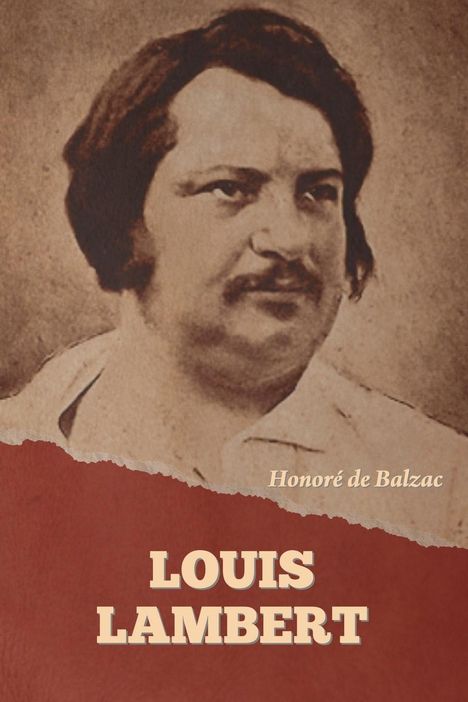Honoré de Balzac: Louis Lambert, Kartoniert / Broschiert
Louis Lambert
(soweit verfügbar beim Lieferanten)
- Verlag:
- IndoEuropeanPublishing.com, 03/2024
- Einband:
- Kartoniert / Broschiert, Paperback
- Sprache:
- Englisch
- ISBN-13:
- 9798889423928
- Artikelnummer:
- 11801131
- Umfang:
- 168 Seiten
- Gewicht:
- 283 g
- Maße:
- 229 x 152 mm
- Stärke:
- 10 mm
- Erscheinungstermin:
- 12.3.2024
- Hinweis
-
Achtung: Artikel ist nicht in deutscher Sprache!
Weitere Ausgaben von Louis Lambert |
Preis |
|---|---|
| Buch, Kartoniert / Broschiert, Englisch | EUR 34,90* |
| Buch, Gebunden, Englisch | EUR 59,90* |
| Buch, Kartoniert / Broschiert, Paperback | EUR 25,90* |
Klappentext
Louis Lambert is an 1832 novel by French novelist and playwright Honoré de Balzac (1799-1850), included in the Études philosophiques section of his novel sequence La Comédie humaine. Set mostly in a school at Vendôme, it examines the life and theories of a boy genius fascinated by the Swedish philosopher Emanuel Swedenborg (1688-1772).
Balzac wrote Louis Lambert during the summer of 1832 while he was staying with friends at the Château de Saché, and published three editions with three different titles. The novel contains a minimal plot, focusing mostly on the metaphysical ideas of its boy-genius protagonist and his only friend (eventually revealed to be Balzac himself). Although it is not a significant example of the realist style for which Balzac became famous, the novel provides insight into the author's own childhood. Specific details and events from the author's life - including punishment from teachers and social ostracism - suggest a fictionalized autobiography.
While he was a student at Vendôme, Balzac wrote an essay called Traité de la Volonté ("Treatise on the Will"); it is described in the novel as being written by Louis Lambert. The essay discusses the philosophy of Swedenborg and others, although Balzac did not explore many of the metaphysical concepts until much later in his life. Ideas analyzed in the essay and elsewhere in the novel include the split between inward and outward existence; the presence of angels and spiritual enlightenment; and the interplay between genius and madness.
Although critics panned the novel, Balzac remained steadfast in his belief that it provided an important look at philosophy, especially metaphysics. As he developed the scheme for La Comédie humaine, he placed Louis Lambert in the Études philosophiques section, and later returned to the same themes in his novel Séraphîta, about an androgynous angelic creature.
Biographers and critics agree that Louis Lambert is a thinly veiled version of the author, evidenced by numerous similarities between them. As a student at the Collège de Vendôme, Balzac was friends with a boy named Louis-Lambert Tinant. Like the title character, Balzac's faith was shaken at the time of his first communion. Balzac read voraciously while in school, and - like Lambert - was often punished for misbehaving in class. The precise details of the school also reflect Balzac's time there: as described in the novel, students were allowed to keep pigeons and tend gardens, and holidays were spent in the dormitories.
Lambert's essay about metaphysics, Traité de la Volonté ("Treatise on the Will"), is another autobiographical reference. Balzac wrote the essay himself as a boy, and - as in the novel - it was confiscated by an angry teacher. Lambert's genius and philosophical erudition are reflections of Balzac's self-conception. Similarly, some critics and biographers have suggested that Lambert's madness reflects (consciously or not) Balzac's own unsteady mental state. His plans to run for parliament and other non-literary ambitions led observers at the time to suspect his sanity.
The many letters in the novel written by Lambert are also based on Balzac's life. After finishing the first version of the book, Balzac tried to win the heart of the Marquise de Castries by sending her a fragmented love letter from the book. Lambert's letters to his uncle about life in Paris from 1817 to 1820, meanwhile, mirror Balzac's own sentiments while attending the Sorbonne at the same time. (wikipedia. org)
Biografie
Honoré de Balzac (1799-1850): Der französische Schriftsteller gilt als Begründer des soziologischen Realismus. Mit seinem Hauptwerk, dem unvollendeten Zyklus 'La Comédie Humaine' versucht er in über 80 Bänden, die Gesellschaft seiner Zeit darzustellen. Balzac, am 20. Mai 1799 in Tours als Sohn eines Rechtsanwalts geboren, wandte sich allerdings erst nach dem Abbruch seines Jura-Studiums an der Pariser Sorbonne der Literatur zu. Zunächst verfasste er jedoch wenig erfolgreich unter verschiedenen Pseudonymen Romane. Ebenso scheiterte er als Verleger, mit seiner Druckerei ging er Bankrott. Erst sein historischer Roman 'La dernier Chouan' bringt 1829 den Durchbruch. Fünf Monate vor seinem Tod am 18. August 1850 heiratet Balzac Eveline Hanska, mit der er bereits viele Jahre Briefkontakt pflegte.Mehr von Honoré de Balzac




